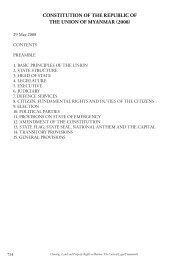Myanmar at the HLP Crossroads: - Displacement Solutions
Myanmar at the HLP Crossroads: - Displacement Solutions
Myanmar at the HLP Crossroads: - Displacement Solutions
Create successful ePaper yourself
Turn your PDF publications into a flip-book with our unique Google optimized e-Paper software.
13<strong>Myanmar</strong> <strong>at</strong> <strong>the</strong> <strong>HLP</strong> <strong>Crossroads</strong>The Law denies access to independent judicial review and may undermine faith in <strong>the</strong> rule of law.Disputes under <strong>the</strong> Farmland Law are handled <strong>at</strong> <strong>the</strong> ward or village level by <strong>the</strong> same body th<strong>at</strong> made <strong>the</strong>initial determin<strong>at</strong>ion (Chapter VIII, Section 22). Chapter VIII of <strong>the</strong> Law <strong>the</strong>n sets up three levels of administr<strong>at</strong>iveappeal, toge<strong>the</strong>r with strict time limits, and decisions become “final” <strong>at</strong> <strong>the</strong> st<strong>at</strong>e or region level. All of <strong>the</strong>bodies <strong>at</strong> <strong>the</strong> various levels have been appointed by <strong>the</strong> Central Farmland Management Body and judicial appealis prohibited under Article XIII, Section 40, although access to <strong>the</strong> courts is available to resolve disputes involvingm<strong>at</strong>ters of inheritance. Moreover, Chapter VII, Section 19 of <strong>the</strong> Law authorizes civil penalties, including fines andeviction, for failure to comply with oblig<strong>at</strong>ions under <strong>the</strong> law and criminal penalties of up to two years imprisonmentunder Chapter XII for failure to comply with any order issued by a farm management body. These harsh civilpenalties and <strong>the</strong> criminaliz<strong>at</strong>ion of non-compliance with administr<strong>at</strong>ive orders are of dubious value.The vague rules with respect to farmers’ oblig<strong>at</strong>ions, <strong>the</strong> multi-layered appeals process with each appell<strong>at</strong>e levelappointed by <strong>the</strong> same central authority and <strong>the</strong> harsh penalties provided by <strong>the</strong> Law make compliance with <strong>the</strong>process quite complex and <strong>the</strong> consequences for non-compliance quite severe. This will inevitably make farmerswho have to deal with <strong>the</strong> administr<strong>at</strong>ive appar<strong>at</strong>us wary and intimid<strong>at</strong>ed. A simpler, more user-friendly and farmerprotectiveprocess would be far preferable. But even a simple administr<strong>at</strong>ive and dispute resolution process canbe intimid<strong>at</strong>ing to people who lack <strong>the</strong> educ<strong>at</strong>ion and experience to navig<strong>at</strong>e through it and thus <strong>the</strong> Governmentshould institute measures like a barefoot paralegal land registr<strong>at</strong>ion campaign to assist with initial registr<strong>at</strong>ion andlegal aid to assist with disputes.For <strong>the</strong> Farmland Law to comply with even <strong>the</strong> minimum <strong>HLP</strong> standards arising from intern<strong>at</strong>ional norms, severalmajor amendments will be required. The Law needs to provide a stable, easily accessible, non-corrupt system ofland title and permission to use registr<strong>at</strong>ion th<strong>at</strong> has as its primary aim <strong>the</strong> conferral of enforceable, long-termtenure rights for those farming <strong>the</strong> land. Farmers need to have access to assistance to help <strong>the</strong>m comply with<strong>the</strong> land registr<strong>at</strong>ion requirements, and to have proper represent<strong>at</strong>ion in negoti<strong>at</strong>ions between <strong>the</strong>m and Governmentand business bodies. The administr<strong>at</strong>ive bodies with which farmers are required to interact through <strong>the</strong> landregistr<strong>at</strong>ion and land certific<strong>at</strong>e process must be more represent<strong>at</strong>ive, more independent and less associ<strong>at</strong>edwith <strong>the</strong> personalities and practices of former Governments. Members of <strong>the</strong>se bodies should receive training andcapacity-building to ensure th<strong>at</strong> <strong>the</strong>y apply regul<strong>at</strong>ions in a manner th<strong>at</strong> is consistent with <strong>the</strong> full spectrum of <strong>the</strong><strong>HLP</strong> rights held by farmers. Recourse to judicial review and legal aid assistance should also be made available.The Vacant, Fallow and Virgin Lands Management Law, which was also signed into law on 30 March 2012, vestsan enormous amount of discretionary authority in a Central Committee for <strong>the</strong> Management of Vacant, Fallowand Virgin Lands. The Central Committee, which is appointed by <strong>the</strong> President, can grant permission to usevacant land, set a tax on <strong>the</strong> land and security fees for its use, and supervise compliance with <strong>the</strong> law. Permissibleuses for <strong>the</strong> previously vacant land include agriculture, livestock, aquaculture, mining and “o<strong>the</strong>r purposesin line with <strong>the</strong> law.” Land use permission can also be granted to citizens, Government organiz<strong>at</strong>ions, NGO’s, andjoint ventures under <strong>the</strong> Foreign Investment Law. With unbridled discretion given to a Presidentially appointedCommittee, no protections for small landholding farmers and no limits or standards to assure <strong>HLP</strong> rights, environmentprotection or sound land use planning, <strong>the</strong> Vacant, Fallow and Virgin Lands Management Law, like <strong>the</strong>Farmland Law, will do nothing to stem ei<strong>the</strong>r land specul<strong>at</strong>ion or land grabbing.Like <strong>the</strong> Farmland Law and <strong>the</strong> Vacant, Fallow and Virgin Lands Management Law, <strong>the</strong> new EnvironmentalConserv<strong>at</strong>ion Law, also adopted in March of 2012, vests full authority and an enormous amount of discretionin a Ministry and Committee under <strong>the</strong> control of <strong>the</strong> President’s office. And while <strong>the</strong> law cre<strong>at</strong>es a vehicle forcomprehensive environmental regul<strong>at</strong>ion with respect to physical impacts and cultural heritage, it is completelysilent on <strong>the</strong> impact of development on social and community life. The most troubling aspect of <strong>the</strong> Law, however,is th<strong>at</strong> Chapter XIII, Section 36 vests absolute and limitless discretion in <strong>the</strong> Environmental Ministry, with <strong>the</strong>approval of <strong>the</strong> Union Government, to ignore any of <strong>the</strong> terms of environmental regul<strong>at</strong>ion as follows: “TheMinistry may, with <strong>the</strong> approval of <strong>the</strong> Union Government, exempt or relieve any Government department, organiz<strong>at</strong>ionor priv<strong>at</strong>e business from complying with any provision contained in this Law for <strong>the</strong> interest of <strong>the</strong> Unionand its people.” This broad loophole in <strong>the</strong> legisl<strong>at</strong>ion has <strong>the</strong> potential to completely undermine <strong>the</strong>effectiveness of <strong>the</strong> Law.













